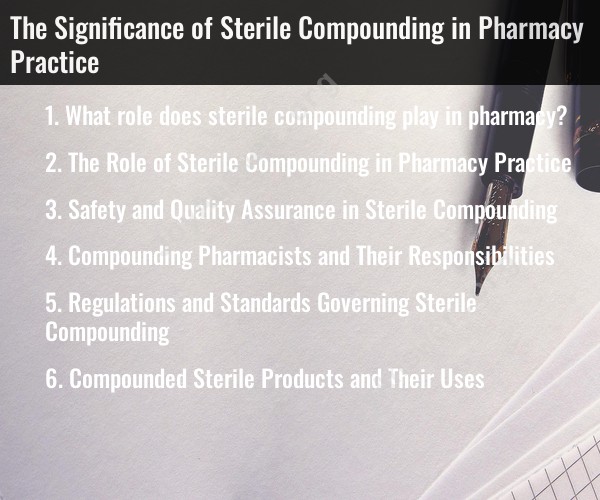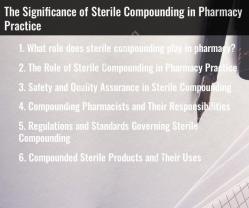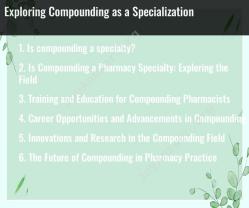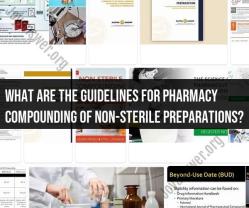What role does sterile compounding play in pharmacy?
Sterile compounding is a critical and highly specialized aspect of pharmacy practice that plays a significant role in ensuring the safe and effective administration of sterile medications and healthcare products. The primary significance of sterile compounding in pharmacy practice includes:
Patient Safety: Sterile compounding is essential for patient safety. It involves the preparation of medications, intravenous (IV) solutions, and other sterile products that are administered directly into the bloodstream or other sterile areas of the body. Any contamination or errors in the compounding process can have serious consequences for the patient.
Customized Medications: Sterile compounding allows pharmacists to create customized sterile medications tailored to individual patient needs. This is particularly important for patients with allergies to certain ingredients, those who require specific dosages or formulations, or individuals with rare medical conditions.
Specialized Formulations: Sterile compounding enables the preparation of specialized dosage forms, such as IV admixtures, injectables, ophthalmic solutions, and intrathecal medications, which may not be available in commercially manufactured products.
Hospitals and Clinical Settings: Sterile compounding is a crucial component of healthcare in hospitals and clinical settings, where healthcare professionals rely on sterile medications to treat critically ill patients, perform surgeries, or provide specialized therapies.
Aseptic Techniques: Sterile compounding practices emphasize aseptic techniques to maintain a sterile environment during the compounding process. These techniques prevent the introduction of contaminants, such as bacteria or fungi, into sterile products.
Regulatory Compliance: Sterile compounding is subject to strict regulations and quality standards, which vary by country. These regulations are in place to ensure that sterile products are prepared safely and adhere to necessary quality and safety standards.
Preventing Infections: Properly prepared sterile medications help prevent infections in patients. Infections associated with contaminated sterile products can lead to serious health complications, extended hospital stays, and increased healthcare costs.
Collaboration: Sterile compounding often involves collaboration between pharmacists, pharmacy technicians, and other healthcare professionals, such as nurses and physicians, to ensure the proper preparation and administration of sterile medications.
Emergency Situations: Sterile compounding is crucial in emergency situations, where patients require immediate access to sterile medications, such as life-saving IV drugs.
Quality Control: Sterile compounding procedures require thorough quality control measures, including sterility testing, endotoxin testing, and potency testing, to ensure the safety and efficacy of the compounded products.
Research and Development: The field of sterile compounding continues to evolve with advancements in pharmaceutical science and technology. Research and development in sterile compounding aim to improve compounding processes, enhance product stability, and expand the range of available sterile medications.
In summary, sterile compounding is vital in pharmacy practice to ensure the safety and well-being of patients who require sterile medications and healthcare products. Pharmacists and pharmacy technicians who specialize in sterile compounding undergo rigorous training and adhere to strict regulatory standards to maintain the highest levels of patient safety and quality of care.
The Role of Sterile Compounding in Pharmacy Practice
Sterile compounding is the process of preparing sterile medications in a pharmacy or other healthcare setting. Sterile medications are those that are free from bacteria, viruses, and other microorganisms. They are typically administered by injection or infusion, or applied to the eyes or skin.
Sterile compounding plays an important role in pharmacy practice by providing patients with access to customized medications that are not commercially available. This may be necessary for patients who have allergies to certain ingredients, who need a specific dosage form, or who have a rare condition.
Safety and Quality Assurance in Sterile Compounding
Safety and quality assurance are essential in sterile compounding. Sterile medications must be prepared in a sterile environment and administered using sterile techniques. This helps to prevent infection and other complications.
Pharmacists must take a number of steps to ensure the safety and quality of compounded sterile products. These steps include:
- Preparing CSPs in a sterile environment, such as a laminar airflow (LAF) hood or a compounding aseptic containment isolator (CACI).
- Using sterile equipment and supplies.
- Following aseptic technique when preparing and administering CSPs.
- Labeling CSPs clearly.
- Performing regular quality control checks on CSPs.
Compounding Pharmacists and Their Responsibilities
Compounding pharmacists are responsible for the preparation and dispensing of compounded sterile products. They must have the specialized training and experience necessary to safely and effectively compound sterile medications.
Compounding pharmacists have a number of responsibilities, including:
- Assessing patient needs and determining the appropriate compounded sterile product.
- Preparing and dispensing CSPs in a safe and timely manner.
- Providing counseling to patients on the use and storage of CSPs.
- Maintaining accurate records of all CSPs prepared and dispensed.
Regulations and Standards Governing Sterile Compounding
Sterile compounding is regulated by a number of different agencies, including the United States Food and Drug Administration (FDA), the United States Pharmacopeia (USP), and state pharmacy boards.
The FDA regulates the manufacturing and distribution of compounded sterile products. The USP sets standards for the preparation of compounded sterile products. State pharmacy boards oversee the practice of compounding pharmacy in their respective states.
Compounded Sterile Products and Their Uses
Compounded sterile products are used to treat a wide variety of medical conditions. Some of the most common uses of compounded sterile products include:
- Pain management
- Infection treatment
- Cancer treatment
- Nutritional support
- Ophthalmic conditions
- Dermatologic conditions
Compounding pharmacists play an important role in providing patients with access to customized medications that are not commercially available. Sterile compounding must be done safely and effectively to prevent infection and other complications.






